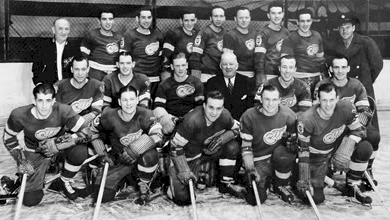
The 1942-43 Detroit Red Wings won the Stanley Cup
The Original Six era is fondly remembered by many older hockey fans, a time when there were only six franchises—Detroit, Montreal, Toronto, Chicago, Boston, and New York. Thanks to a balanced schedule, in which each team played all others in an equal number of home and away games, rivalries and grudges had a chance to ripen over the course of the season.
Some date the Original Six back to the National Hockey League’s earliest days. However, strictly speaking, the era lasted just a quarter-century, from 1942 (when the league shrank from seven teams) until 1967 (when the NHL doubled in size with the addition of six expansion teams). Before 1942, the NHL fluctuated in size from as few as 3 teams to as many as 10, resulting in unbalanced schedules and a constantly changing playoff system.
At the end of the 1941-42 campaign, the New York Americans—a floundering franchise that had moved to Brooklyn for its final season—finally folded. This made the NHL a solid six-pack circuit and allowed for symmetrical scheduling. The normal 48-game schedule was expanded to 50 games, with each team facing every other team five times on home ice and five times on the road. The schedule would expand to 60 games in 1946 and 70 games in 1949, each time allowing for a perfectly equal number of home and away games between each club.
On November 1, 1942, the Wings kicked off the first season of the Original Six era by blanking the Bruins, 3-0, at Olympia Stadium. The two points were the first of a team-record 61 points Detroit would total in ’42-43. Boston would wind up the season in second place, four games behind.
Key contributors to the Wings’ 25-14-11 record were Johnny Mowers, whose six shutouts were one more than the rest of the league combined; forwards Sid Abel, Carl Liscombe, and Syd Howe; and defenseman Jack Stewart, whose bone-crushing hits earned him the sobriquet “Black Jack” and a spot on the First All-Star Team. Mowers received the Vezina Trophy and a First-Team selection, as well.
After many years of tinkering with its “second season,” including various elimination rounds of varying length, the NHL unveiled a newly formatted playoff system in the spring of ’43. It called for best-of-seven series between the first- and third-place clubs and the second- and fourth-place finishers. The winners of this semifinal round would then meet for the Cup in a best-of-seven finals. This simple and uncomplicated playoff structure would stay the same throughout the entire Original Six era.
The Wings won their third Stanley Cup in eight seasons in convincing fashion. To the delight of coach and general manager Jack Adams, they thrashed their old nemesis, the Maple Leafs, in six games in their semifinal matchup. It was the first time Detroit had gotten past Toronto in the playoffs since 1936. Meanwhile, Boston beat Montreal in five games.
The finals began on April Fool’s Day in Detroit, with the Wings rolling over the Bruins by a 6-2 score. “Mud” Bruneteau, who had led the Wings with 23 goals, notched the second playoff hat trick in the team’s history. Three days later, Detroit won again, 4-3, before moving on to Boston. Mowers was untouchable. He pushed aside every puck fired his way as the Red Wings broomed the Bruins with a 4-0 victory in Game 3 and a 2-0 win in Game 4.
Afterwards, the champions “had to run like hell to catch the train” back to Detroit, recalled Liscombe, who had led all playoff scorers with 14 points. “We barely had time to stop and buy sandwiches before we got to the station. There were some Red Wing fans on the train, too, so we set up the Stanley Cup in the men’s room on the train, filled it with beer, and served it to everyone in paper cups.”


